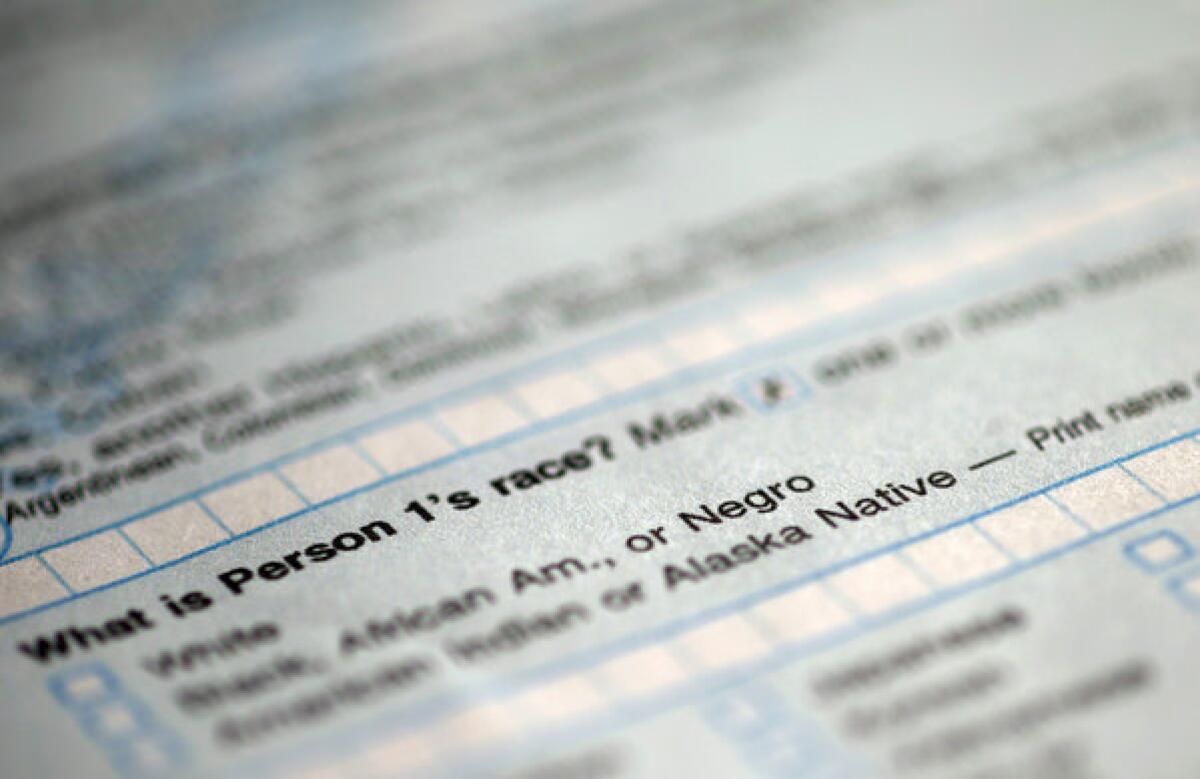The many shades of meaning in ‘Negro’

- Share via
I got a clue even before my column ran this week that its subject — what “Negro” means these days — might make some folks uncomfortable.
I’d pulled up to the valet stand at the Hilton and waited while the young man fumbled through the standard question about the evening’s event. “You’re here for the United … uh, United … uh, the College Fund dinner?” he asked.
Yes. The United Negro College Fund. He’d managed to leave that word out.
I understand why it flummoxed him. By the time he was born, we’d moved past that to “black” and on to “African American.”
His discomfort with “Negro” reflects the sort of public sentiment that led the Census Bureau to remove the word from its list of labels Americans can use to describe themselves. Census officials consider it an artifact, outmoded and potentially offensive.
In my column Tuesday, I disagreed. In trying to be politically correct, the bureau shoved a generation to the sidelines and erased a part of our history.
The column prompted plenty of debate among readers. Many objected to the very idea that people in this country still feel bound to identify by race and ethnicity.
“Why not just be Americans?” more than one person asked.
That’s the same question I remember asking my mother 50 years ago, when faced with the puzzling reality of “colored” drinking fountains on a visit to the Southern town where she’d grown up.
Our nation’s history makes that more difficult than it ought to be.
For all sorts of “outlier” groups accustomed to discrimination, the mere act of deciding what to be called can feel revolutionary. Just ask gays (formerly “homosexuals”) or the developmentally disabled (no longer “retarded”).
A new label can shape the conversation and pave the way for change — and also leave us ever afraid of offending someone if we choose the wrong one from the cache of ever-shifting names.
I could feel that concern in messages from readers, like this question from “an elderly white woman,” puzzled by my preference for “black.”
“I thought the term ‘African American’ to be the more respectful reference,” she wrote. “Do you mean it is not?”
“CONFUSED HERE” the subject line on her email read.
::
It is confusing keeping up with what everybody wants to be called. And even if you manage to stay current, you’re liable to run into a renegade and say something wrong.
Groups don’t adopt their labels by fiat, after all. New ones take time to gain traction, and old ones are slow to die.
In 1988, the Rev. Jesse Jackson, then a presidential candidate, held a news conference to announce that black Americans would now be known as African Americans. The media duly reported that “black leaders ... say members of their race would prefer to be called African Americans rather than blacks.”
But the black folks he was presumably speaking for took years to get on board — if they did at all.
“African American is too vague,” complained Howard Payne, who is old enough to remember “when the Afro wasn’t just a fashion statement but showed pride in our kinky hair.”
Recently, Payne, 69, was on jury duty “and struck up a conversation with a VERY Caucasian woman,” he wrote in his email. “She was born in South Africa, moved to the USA and became a citizen.” That makes her the African American, white skin and all.
Then there was the Asian American reader who told me she wasn’t offended by the label “Oriental” but her white mother-in-law considered it an insult. “She would say ‘Christine, you aren’t a rug.’
“She insisted on using the word Asian.... Oriental had never bothered me until [she] brought it up.”
::
Several readers said we ought to launch a campaign aimed at bringing “Negro” back. But even I can recognize the futility in that.
When my daughter asked last week what my column would be about, I told her “being Negro” and she laughed out loud. Then she apologized, trying not to smile.
She knows how seriously I take this stuff. But the hand-wringing over what we ought to call each other doesn’t make sense to her.
Her generation has come of age in an era of blurring boundaries and racial and ethnic shifts. More than 9 million people claimed more than one race on the most recent census. And one in seven weddings today celebrates what my generation used to call, with eyebrows raised, “mixed marriages.”
Librarian Judith Markoff Hansen was among many readers who noted and welcomed the trend.
“I have joked for years to get my husband and others to call ourselves ‘Pink Americans’ … for clarity,” she wrote. “But then, in our multiracial, multi-mixed and growing ever more-so state, I look around me and Pinks are becoming browner/yellower/blacker, while Blacks are becoming yellower/browner/ pinker.
“We someday will not be able to use color for anything but historical description.”
More to Read
Sign up for Essential California
The most important California stories and recommendations in your inbox every morning.
You may occasionally receive promotional content from the Los Angeles Times.













